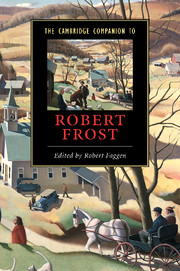Book contents
- Frontmatter
- Introduction
- 1 “Stay Unassuming”
- 2 Frost Biography and A Witness Tree
- 3 Frost and the Questions of Pastoral
- 4 Frost and the Ancient Muses
- 5 Frost as a New England Poet
- 6 “Across Spaces of the Footed Line”
- 7 Frost’s Poetry of Metaphor
- 8 Frost and the Meditative Lyric
- 9 Frost’s Poetics of Control
- 10 Frost’s Politics and the Cold War
- 11 “Synonymous with Kept”
- 12 Human Presence in Frost’s Universe
- Select bibliography
- Index
3 - Frost and the Questions of Pastoral
Published online by Cambridge University Press: 28 May 2006
- Frontmatter
- Introduction
- 1 “Stay Unassuming”
- 2 Frost Biography and A Witness Tree
- 3 Frost and the Questions of Pastoral
- 4 Frost and the Ancient Muses
- 5 Frost as a New England Poet
- 6 “Across Spaces of the Footed Line”
- 7 Frost’s Poetry of Metaphor
- 8 Frost and the Meditative Lyric
- 9 Frost’s Poetics of Control
- 10 Frost’s Politics and the Cold War
- 11 “Synonymous with Kept”
- 12 Human Presence in Frost’s Universe
- Select bibliography
- Index
Summary
To call Robert Frost a pastoral poet is at once to say too much and too little. Frost himself said that “he first heard the speaking voice in poetry in Virgil's Eclogues.” Virgil's ten Eclogues are models of pastoral poetry, dialogues or dramatic monologues of shepherds dwelling in a mythic Arcadia, a land of innocence and beauty. Frost's relation to Virgilian pastoral, as Reuben Brower has observed, “is so deep and pervasive that it is nearly impossible to describe.” Ezra Pound shrewdly called Frost's poems “modern georgics.” He was referring to Virgil's four great didactic poems about farm work that form the basis of a tradition that stands in contrast to pastoral; it is a type of didactic poetry extolling hard labor and a scientific approach to nature. Pastoral itself is a rich and complex tradition. Not only a genre or set of conventions, it is often a mode by which authors from Theocritus and Virgil to Dante and Milton as well as Wordsworth and Thoreau have explored questions of human equality, man's place in nature, and the nature of faith. If by pastoral one means a mode that emphasizes the beauty and simplicity of country life, then Frost's poetry seems decidedly dissonant. But Frost's dissonant renewal of this ancient tradition allowed him to explore complex, modern attitudes about democracy, science, and faith.
- Type
- Chapter
- Information
- The Cambridge Companion to Robert Frost , pp. 49 - 74Publisher: Cambridge University PressPrint publication year: 2001
- 6
- Cited by

